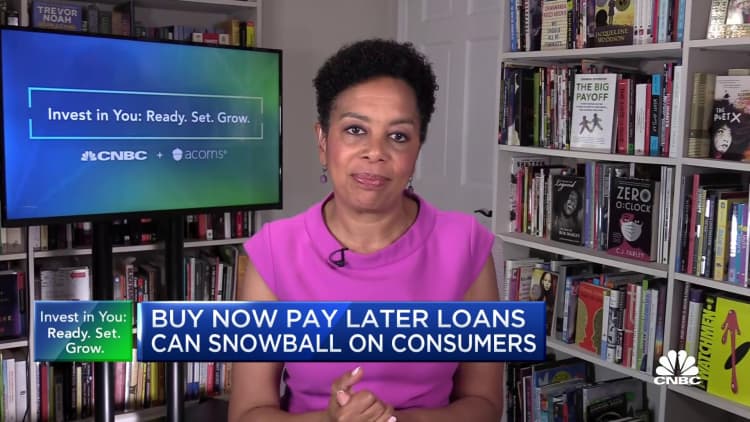As many consumers struggle to make ends meet and cover the rising costs of groceries, gas and nearly everything else, about three in five U.S. consumers admit they are living paycheck to paycheck, according to a new survey.
In addition, more than 25% say they spent more than they've earned in the past six months.
Some consumers may be turning to credit cards to help pay for expenses. Yet many, who are living paycheck to paycheck, have been having difficulty making timely payments on cards that carry a higher-than-average card balance, the survey found.
So how can you better manage your credit and credit cards during a financially stressful time? Here are three tips to help you get started.
1. Lower the interest rate on your credit card
The Federal Reserve is trying to tame inflation by increasing interest rates to help curb demand. Yet that makes the cost of borrowing on everything from auto loans to credit cards a lot more expensive. The average annual percentage rate on a new credit card is now more than 20%, according to Lending Tree.
Try to pay little or no interest on your cards by switching to a 0% interest balance transfer card or transferring your existing balances on high-interest credit cards to one that offers no interest, at least for a while. Many of those cards have 0% introductory offers that last 12 to 15 months; and some may go as long as two years.
More from Invest in You:
Suze Orman has a warning about Great Resignation resignations
These are the 10 fastest-growing entry-level jobs
Before you start investing, here's what experts want you to know
Or you can ask your card issuer to lower the interest rate.
"Far too few people do it, but 70% of those who asked in the past year got at least some reduction," said LendingTree's chief credit analyst Matt Schulz. "The average decrease was 7 percentage points, which is significant."
2. Use autopay and alerts to manage balances
The average credit card balance was $5,219 in May 2022, about a $500 increase in 12 months, according to a report by VantageScore. As account balances have grown, credit card delinquencies — payments that are 30 to 90 days late — also have been trending higher since spring 2021, the study found.
"Consumer delinquencies are on the rise again," said Credit Karma CEO Kenneth Lin. "They almost doubled since the low of the pandemic — and that is troubling."
To make sure you pay your credit card bills on time, set up automatic payments so that at least the minimum amount due (or better yet, a bit more money) is taken out of your bank account and sent directly to the card issuer every month.
Then create calendar reminders and alerts on your phone or laptop — or use an actual calendar — to mark the dates when the payment will be pulled, as well as the date that the payment is due. Double check on both dates that the transaction and payment have been made.
You want to avoid late fees, which will cost you up to $30 the first time you're late and $41 for subsequent incidents. And, if you can, try to pay the balance in full every month to avoid accruing interest.
3. Don't count on personal loans or buy now, pay later
Some consumers may opt to consolidate their credit card debt with a personal loan. The interest rate on a personal loan may be lower than your existing credit card rate, depending on your credit score. Generally, the higher your score, the lower the rate. Personal loan rates currently range from 3% to 36%, according to Bankrate.
However, personal loan rates are variable and will tick higher as the Fed raises interest rates. Making regular on-time payments on your personal loan can be a positive contribution to your credit history.

Yet some credit experts worry that once consumers have transferred balances to a personal loan, some may go back to racking up debt on their cards. For those of you who might be tempted to do this, you may want to get someone to hide those cards.
Meanwhile, as buy now, pay later products become more popular, an Experian study found four out of five consumers said they use BNPL to avoid credit card debt. With BNPL, the ability to buy items with what are basically short-term loans, make a down payment and then pay in three more installments over six weeks can be appealing.
However, BNPL products generally don't report your payment information to the major credit bureaus (Equifax, Experian and TransUnion). However, they may report when you miss a payment and become delinquent. So you don't get a credit boost from positive payment history and negative information could go on your credit report and hurt your credit score.
SIGN UP: Money 101 is an 8-week learning course to financial freedom, delivered weekly to your inbox. For the Spanish version Dinero 101, click here.
Disclosure: NBCUniversal and Comcast Ventures are investors in Acorns.







